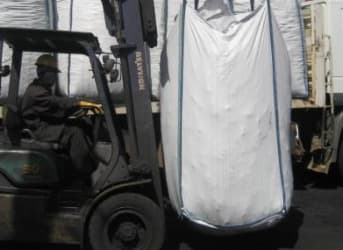China, the worlds’ most populous country, has consistently ranked among the top energy producers and consumers in the world. The Asian giant has relied heavily on coal as it contributes to almost 65 percent of the country’s massive energy consumption. Since coal is a major source of carbon emissions in China, the Chinese government is aiming to reduce its usage to 62 percent of primary energy consumption by the year 2020 in order to reduce its air pollution levels and greenhouse gas emissions. In a rather alarming revelation, a recent report from China’s Ministry of Environment Protection revealed that only eight of its cities could pass the national air quality standards in 2014.

Chinese cities with worst air pollution
Image Source: CNN
Although China has expressed its intention of moving away from coal, it is quietly using a fuel which is even dirtier than coal: Petcoke. Related: Pessimism Amongst Oil Traders Reaches 5 Year High
What is Petcoke and how much pollution does it cause?
Petroleum coke, or Petcoke, is a byproduct of the coker or cracking units of an oil refinery. Petcoke is predominantly produced by complex refineries that use heavy crude oil as their feedstock, with high sulphur content. Petcoke comes in two forms: One is a low-sulphur, low-metal content petcoke, which is used in processes related to metal manufacturing that does not involve combustion. The other is a high-sulphur, heavy-metal-based petcoke, which is increasingly being used as an alternative to conventional coal in China’s power plants.
Petcoke releases more CO2 (around 5 to 10 percent more) than coal in addition to metal contaminants like arsenic, nickel, chromium, cadmium and mercury. Most of the petcoke that is consumed in China is produced domestically in its own refineries. But China is also importing massive quantities of petcoke from the United States. Related: Has The E&P Industry Lost Touch With Reality?
Why is China turning to petcoke?

As U.S crude oil imports of Canada’s tar sands have increased consistently, U.S. refiners have ended up with excess volumes of petcoke. Thanks to the tough U.S. regulations related to the use and storage of Petcoke, U.S refiners are happy to export the ‘dirty fuel’ to countries like China where demand for petcoke is high. Currently, China is among the biggest importers of petcoke from U.S. (see the above figure).
In 2013, China burned around 33 million metric tons of petcoke, a byproduct which looks like coal but has higher carbon emissions. Being a refinery byproduct, petcoke is cheaper and sells at an average discount of 25 percent when compared with coal.
A report by Oil Change International stated that refiners have an incentive to sell petcoke at cheaper rates since they cannot store the bulky byproduct. “The utilities determine their fuel choice, such as the competition between coal and Petcoke, on a per-million-Btu basis. Petcoke pricing usually tracks behind coal, often rising when coal rises,” said an industry analyst. But the price advantage of petcoke over coal is easily offset by its long term environmental impact. Related: Obama’s Nuclear Waste Blunders Could Cost Taxpayers Over $20 Billion
Is the Chinese government doing anything to reduce petcoke consumption?

Although the Chinese government is taking some steps to reduce its air pollution, the pollution resulting from burning high-sulphur petcoke has neither been monitored nor regulated, as there are no statistics and consumption data that detail the quantum of emissions resulting from burning petcoke. It is extremely important that China starts measuring the environmental impact of petcoke and creates the necessary policies and regulations to limit the use of this dirty fuel. The country’s policy makers need to urgently analyze the long term repercussions of using large quantities of petcoke against its short-term economic benefits.
By Gaurav Agnihotri for Oilprice.com
More Top Reads From Oilprice.com:
- Midweek Sector Update: China’s Stock Market Crash Looming Large Over Oil Prices
- Cameroon Ramping Up Oil Production As Prices Moving Down
- Top Factors Undermining Any Oil Price Recovery



















Isnt "selling of petcoke" against Kyoto protocol, and should been avoided by USA.. There should be a deep impact in carbon Trading of china because of this petcoke